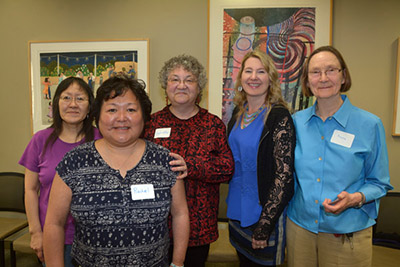WCER Welcomes Chinese, Azerbaijani, Native Alaskan Delegations
June 12, 2015

In the past few weeks, visitors from China, Azerbaijan and Alaska have visited the Wisconsin Center for Education Research to learn more about its research and offer perspectives on their own experiences in education.
WCER is part of the School of Education at the University of Wisconsin–Madison. It has more than 70 principal investigators, hundreds of researchers and support staff and an estimated $55 million budget dedicated to studying important issues in education. WCER emphasizes international research and maintains collaborations with researchers and institutions of culture and higher education in dozens of countries on six continents.
As part of a tour of the United States by the National Committee on US.-China Relations, a dozen policymakers and educators from China toured WCER and met with researchers Matthew T. Hora and Xueli Wang on Thursday, April 30. The delegation included Huang Yao, the Director-General of Vocational and Adult Education in China’s Ministry of Education, and Guo Dongming, the president of Dalian Industry School.
The Chinese delegation contacted Hora and arranged the visit after his research group published an op-ed in Inside Higher Ed that investigated the skills gap in Wisconsin. Particularly, the delegation was interested in learning more about Hora’s argument that non-cognitive skills such as collaboration and work ethic should receive greater emphasis in workforce development and postsecondary education policy. Hora’s research was conducted through the Center on Education and Work, a WCER project. The group also met with Wang, herself a native of Harbin, China, who recently won two separate grants to study course-taking patterns among community college students planning to transfer into baccalaureate science, technology, engineering and math (STEM) programs and students at Wisconsin’s two-year colleges who aspire to transfer into STEM majors at four-year institutions.
On May 5, a group of education experts from Azerbaijan visited WCER as part of the university’s International Visitor Leadership Program, an initiative of the U.S. State Department. The group met with WCER researchers Cathy Compton-Lilly, Bradley Carl and Steve Kimball. Compton-Lilly studies youth literacy and is currently engaged in a study following fifteen children from immigrant families from primary school through high school. Carl is the associate director and a researcher at WCER’s Value-Added Research Center and his work focuses on the design, implementation, and evaluation of state educator effectiveness and school accountability systems. Kimball conducts research with the Consortium for Policy Research in Education (CPRE) and with VARC. Carl and Kimball are both leaders in developing the Wisconsin Educator Effectiveness System.
From May 7-8, three visitors from the Lower Kuskokwim School District in Bethel, Alaska were invited to visit WCER by WIDA, a WCER project that advances academic language development and academic achievement for linguistically diverse students through high quality standards, assessments, research, and professional development for educators. The group included Gayle Miller, the district’s director of curriculum and support programs, as well as two Yup'ik language experts, Rachael Nicholai and Betty Gilman. Miller, Nicholai and Gilman together developed and implemented a dual language program in Yup’ik and English in their district, and are leading an effort to develop a Yup'ik assessment program for students in pre-kindergarten through sixth grade.
The visit was the culmination of their ongoing collaboration with WIDA researchers and staff including WIDA Research Director Gary Cook and WIDA researchers Rosalie Grant and Paula White. As part of their work, Grant and White visited the Lower Kuskokwim School District in December 2014 and met with Miller, who was named a WIDA Featured Educator in January 2014.


